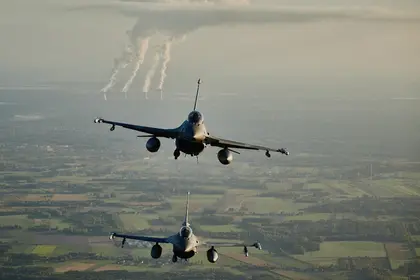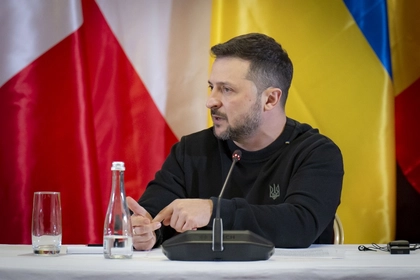On May 10, 2023, Vadym Prystaiko, Ambassador of Ukraine to Great Britain, announced that the U K would be the first country to start training Ukrainian pilots according to NATO standards.
So, when the political decision to send the F-16 jet fighters to Ukraine is finally made, Ukrainian pilots will quickly master the new technology as they will have already obtained the basic qualification required from NATO pilots.
JOIN US ON TELEGRAM
Follow our coverage of the war on the @Kyivpost_official.
If we add the combat experience of Ukrainian aviators to the equation, we can safely assume that the F-16 jet fighters will play an important role in liberating Ukrainian territories and strengthening its air defense.
One of the most important aspects of strengthening Ukraine’s defense is the supply of military aircraft. Ukraine recently received 10 MiG-29 aircraft from Slovakia, which is an important step in strengthening the Ukrainian air force.
Several dozen Ukrainian pilots have already been selected by the Air Force Command to undergo a training assessment to fly F-16 multirole fighters. This was reported by Yuriy Ignat, the spokesman for the Ukrainian Air Force. According to him, Ukraine is currently in dire need of modern Western aircraft.
He also added that upon receiving the F-16 jet fighters, the command plans to completely switch to them and eventually drop the use of the outdated Soviet aircraft. As of now, the best Ukrainian English-speaking pilots with real-life combat experience have been selected to undergo a training assessment to fly these aircraft.

Russia Planned Genocide Long Before Invasion: Kill Lists, Crematoriums, Mass Graves – HUR
He said that besides pilots we also need trained combat control officers in charge of flight control, as well as military engineers and mechanics who can keep F-16 fighters running.
Since the beginning of the war, two Ukrainian pilots have already passed the evaluation of fighter piloting skills in the US.
Ukrainian pilots spent three weeks training on the F-16 simulator. During this time, the pilots mastered the basics of controlling the F-16, and even tried using virtual “weapons.” The results revealed a high success rate: pilots can master the F-16 aircraft and learn to operate the weapons systems in less than six months.
According to the assessment of the American instructors, since Ukrainian pilots already possess first-hand combat experience, they will be able to obtain the required level of qualification to control F-16 fighters in less than six months of training.
This was reported by Brig. Gen. Serhiy Golubtsov, Chief of Aviation of the Air Force Command.
He also noted that the experience gained by Ukrainian pilots will make the period of their training significantly shorter.
“The skills of our pilots were highly rated, even though they were not ace fliers. Each pilot has their own strong and weak points, so they need an individualized approach to training. But after this assessment in the US, we can make the preparation process considerably shorter. This is great news for us,” said Golubtsov.
F-16
The F-16 Fighting Falcon is a fourth-generation multirole fighter developed by the American company General Dynamics.
This aircraft is the most numerous fighter jet of the 4th generation in the world. In total, more than 4,600 F-16s have been produced. For comparison, only 1,600 MiG-29 - its closest competitor - have ever been produced, which is almost three times less.
The F-16 made its first flight back in 1974, but due to constant modernization, this jet remains relevant even 50 years later. The US Air Force is considering extending its service life until 2048, and it’s also unlikely that the aircraft will be decommissioned sooner in other countries. It is also because the F-16 was specially designed for long-term use.
The airframe life of the F-16 aircraft, after its first modification, was 8,000 hours – under normal operating conditions, this equates to approximately 40 years.
The MiG-29 situation is completely different. The first versions of these fighters had a very limited airframe life - only 2,500 hours. In later modifications, the airframe life was increased to 4,000 hours - half that of the American fighters. Accordingly, the operation of MiGs for more than 20 years was simply not foreseen.
Front-line fighter
The F-16 was primarily designed for air combat. It is fast and maneuverable, and the cockpit has an excellent field of view, which helps to track targets during air combat. But although the F-16 was created primarily for aerial confrontation, it can act as a tactical bomber, front-line attack aircraft, air-to-air interceptor, and electronic warfare aircraft.
All of this comes with its impressive maximum combat load of 8,855 kg on 9 suspension points. Again, compared to the closest Soviet analog, the MiG-29 can carry only 3500 kg of weapons on 6 points.
Armament of the F-16
First, the American F-16 is of interest to Ukraine due to the range of weapons that can be installed on it. The F-16 has a much wider range of weapons.
The MiG-29 is just a regular fighter armed with a cannon and two types of air-to-air missiles. Of course, it can use both free-falling bombs and unguided rockets to strike ground targets. But the MiG does not have any special targeting pods and smart bombs that the F-16 has. And the MiG-29 radar cannot detect targets on the ground.
Since the beginning of the war, the United States has been handing over air-to-air missiles to Ukraine, which we cannot use to their full capacity. Problems appear as early as during the mounting of these missiles on Soviet fighters. This is because modern American missiles were never standardized for use with Soviet aircraft and have completely different mounts.
In addition, there are problems with the integration of control and guidance systems of American missiles with the fighter onboard systems. Our Ukrainian military aircraft are not equipped with special control systems for Western weapons, which does not allow us to use all the capabilities of the missiles transferred to us.
Air-to-air missiles
For aerial combat, the F-16 has AIM-120 AMRAAM missiles. It is the most popular and one of the best medium-range missiles in the world. The American all-weather missile is designed to hit aerial targets beyond visual range. The missile can independently track and target the adversary aircraft, which allows it to be used as a “fire and forget” guidance.
The first versions of these missiles can shoot down targets at 55 to 70 kilometers. The latest modifications of the AIM-120C have a range up to 105 km, and the AIM-120D will track and destroy a target at up to 180 kilometers.
It is interesting that the AIM-120 is used in the NASAMS air defense systems, which are already in Ukraine. But when launched from an airplane, and not from the ground, their employment range is much farther.
Pilots of the Air Force of Ukraine performing tasks on the Su-27 and MiG-29 do not have missiles with target-seeking devices in their arsenal. In order to destroy the air threats, our pilots must constantly “illuminate” the target for the missile, from launch to impact.
Air-to-surface missiles for striking targets on the ground
AGM-65 Maverick is designed for the prompt delivery of high-precision strikes on the enemy. It allows the effective destruction of well-armored moving targets, even in urban environments. In one sortie, the F-16 can use up to 6 such missiles and destroy heavily armored vehicles of the enemy from up to 40 kilometers. The record shows that these missiles hit and destroy the target in 80-90 percent of all cases.
AGM-84 Harpoon is an anti-ship missile with a range of 140 to 315 km, depending on the variant and modification. Such missiles would allow Ukraine to create a very serious threat to the Black Sea Fleet of the Russian Federation, without even entering the enemy’s air defense zone.
AGM-88 HARM is an American anti-radar missile with a range of 100 to 300 km, depending on the modification and application conditions. It is a homing missile that can hit high-frequency radars. Thanks to its technology, the HARM missile can determine the location of the target and hit it, even if the radar is already turned off.
AGM-158 JASSM is a cruise missile from the renowned company Lockheed Martin. Even in the first modifications, this weapon can fly up to 370 kilometers. In the version with increased range, this distance increases up to 980 kilometers, which is the same distance as from Lutsk to Moscow. The missile is equipped with satellite navigation, an inertial guidance system, and an infrared seeker head capable of recognizing objects. At such a distance, very high accuracy is claimed to be two to four meters. However, the main feature of this missile is the use of “stealth” technology, which allows it to remain unnoticed by radars thanks to a special body shape and the use of carbon fiber. The F-16 can carry up to two of these cruise missiles simultaneously.
Thanks to its versatility, the F-16 is superior to our MiG-29 in almost all respects. Besides, the F-16 is a truly versatile aircraft, while the MiG-29 is just a good fighter. On the other hand, the F-16 is a combat unit of “network-centric warfare” – it allows data exchange about targets both between aircraft and ground-based radars, which considerably increases its effectiveness in combat.
The views expressed in this opinion article are the author’s and not necessarily those of Kyiv Post.
You can also highlight the text and press Ctrl + Enter






